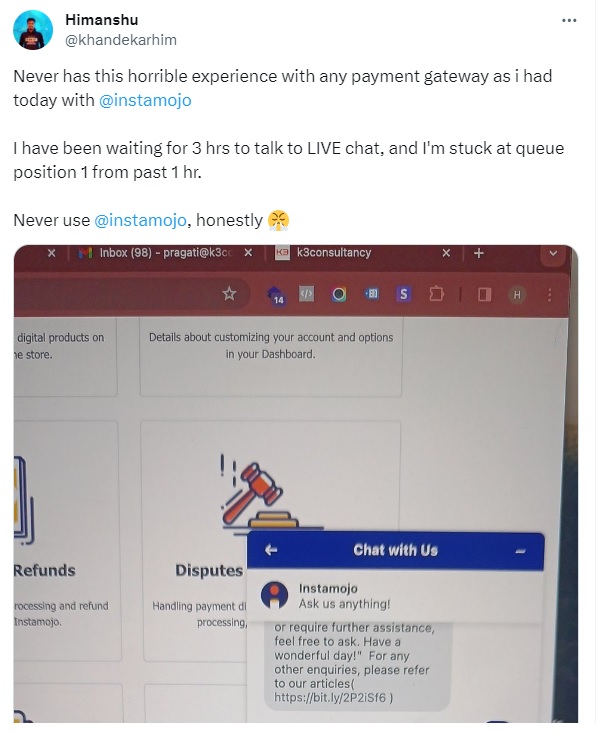On September 27, 2023, a financial maelstrom swept through India’s vibrant fintech landscape when the Reserve Bank of India (RBI) cracked its whip on leading payments startup Mastercard-backed Instamojo among dozens of other startups by rejecting their payment aggregator licence application.
The central bank’s whip fell on 25 existing payment aggregators (PA) licence holders and and 47 applicants who saw their applications rejected. As per the notice, the existing aggregators were granted a 180-day sunset clause to gradually wind down payment aggregator operations.
This wasn’t the first time the RBI’s heavy hand had sent shockwaves through the ecosystem. In April last year, SBM Bank India blocked the corporate credit cards issued to some of the customers of its fintech partners due to KYC concerns.
While the SBM fiasco turned into a nightmare for eight lakh MSMEs and startups using co-branded corporate cards, history seemed to be repeating itself for PAs.
Notably, if the SBM fiasco impacted around 800K individuals, as many as 3 Mn merchants are estimated to be impacted by the RBI’s PA licence application cancellation move, with Instamojo alone sitting at around 2.5 Mn strong merchant base back then.
Well, for millions of startups and MSMEs, PAs have been playing a crucial role, and Instamojo was just one of the many platforms awaiting a licence. But it was the worst impacted.
In November 2023, Instamojo announced it is shutting down its PA business. Originally established in 2012 as a payment solutions provider for small and medium enterprises, the startup diversified its offerings in 2021 by introducing an ecommerce software platform. The company offers software to assist businesses in establishing online stores while providing essential services such as branding, analytics, and shipping.
Since its inception, Instamojo has successfully secured $15.2 Mn from notable names such as Mastercard, Gunosy Capital, Kalaari Capital, and Blume Ventures. But being rejected by the RBI in the PA game was a big blow.
Why Did RBI Reject PA Licence Applications?
According to the RBI’s Guidelines on Regulation of Payment Aggregators and Payment Gateways, licence holders must maintain a net worth of INR 15 Cr for the first two financial years and a net worth of INR 25 Cr after that.
Furthermore, this criteria is not a one-time requirement for the licence. Payment aggregators must consistently adhere to licensing prerequisites.
Those with PA licences need to submit monthly reports related to transaction statistics, fraud, and cybersecurity incidents by the 7th of every month. They are required to produce a certificate of auditors on their Escrow balance, a certificate of bankers on Escrow account credits and debits, and customer complaints reports quarterly as well as a yearly net-worth certificate by 31st of December every year.
Though this is not an exhaustive list of compliance, non-compliance can lead to penalties and potential license suspension.
Some of the existing PAs, including Instamojo, failed to meet the criteria.
Speaking with Inc42, Akash Gehani, the cofounder of Instamojo said, “There have been differences in how we arrived at the net worth and how the central bank calculated. Instamojo met all the other required compliance, barring the net worth one.”
lockquote>
Meanwhile, a source from the RBI’s Payment and Settlement Systems in India said that the licences were revoked on various grounds and not just for not meeting certain criteria. In multiple cases, the licences have been withdrawn. Only in some cases, it has been revoked.
We were told that Worldline India Private Limited’s PA licence has been withdrawn because another subsidiary Worldline ePayments was granted the licence. Similarly, Ezetap’s (acquired by Razorpay in 2022) licence was also withdrawn.
“Some of the other entities pivoted their product line and showed no will to hold their PA licence any longer,” the source added.
lockquote>
Panic Engulfed Instamojo Customers
Panic engulfed merchants when the cancellation news hit the market. “There was no prior intimation of what was happening. When we heard the news, INR 14 Lakh were stuck with Instamojo,” Ashish Gupta, founder of edtech platform Bambinos Live, told Inc42.
Not to mention, this is just one of many examples. As the chaos intensified, social media platforms got flooded with merchants complaining about not receiving their payouts.
The plight of Kundan Singh, the founder and CEO of Icon Technosys, is yet another example to consider. When this entire fiasco was unfolding, Singh said his company faced a lot of issues in receiving payments from its clients.
“The profile dashboard of our company on the Instamojo platform directed us to resubmit KYC-related documents. Despite our submissions, there was no communication from the company’s side for the next one month,” Singh said. He added that his company is yet to receive the pending payouts.
lockquote>
Another case is of Dr. Kapil Kakar, a psychologist, whose payments have been pending since October last year.
“After Instamojo’s merchants raised their voices, the company refunded the money. However, instead of processing the payments to our accounts, they refunded the money to our customers,” Kakar said.
Meanwhile, more than a dozen merchants that Inc42 spoke with highlighted that no communication from Instamojo made matters worse. Further, we were told that by the end of November, the dashboards of many customers that were earlier showing outstanding payments stopped displaying the amount or in some cases the right figures.
Bambinos Live’s Gupta said that initially on the dashboard, the outstanding amount was around INR 14 Lakh, which turned to INR 12.5 Lakh before disappearing altogether. “We had to manually calculate the payouts and do the follow-up,” he added.
Himanshu Khandekar, the founder of K3 Consultancy, said it was like living his worst nightmare. “Our business was nearly stuck for two months. The Instamojo team kept asking for some documents and never verified them. Payment options, including UPI, suddenly disappeared. The only option available was the wallet payment, which hardly anyone uses,” Khandekar said.
lockquote>
Amid slow and standard responses from Instamojo, some of the users even filed a police complaint.
Could The Chaos Have Been Averted?
In its notice, the RBI instructed the existing 25 PAs to halt online payment aggregation activities and close nodal/escrow accounts within 180 days from the application’s return date.
Considering the 180-day sunset clause, could Instamojo have handled the situation any differently?
Highly unlikely, Gehani clarified, because despite the RBI’s stated sunset period, Instamojo was directed to halt operations immediately upon receiving the RBI letter. The abrupt service interruption was, therefore, unavoidable, but communication with merchants could have been better.
lockquote>
It’s pertinent to note that Instamojo did not inform the merchants about the RBI order but instead attributed the issue to a ‘technical glitch’. After failing to secure the PA licence, Instamojo joined hands with third parties. Before onboarding, a re-KYC of all merchants was required, which resulted in delays.
“While we fully understand the plight of merchants and the disruption in their business, especially during the festive season, one needs to understand the scale. It was like moving one city to another location. No matter how well you do, there will be issues,” Gehani explained.
Instamojo is currently at a critical turning point, with payments accounting for three-quarters of its revenues. The RBI’s order has compelled the company to reassess new revenue streams.
“Despite everything, we will continue to offer a one-stop solution to D2C merchants. For payments, we have already partnered with other fintechs,” Gehani said.
While Instamojo has been able to bring down the share of payments in its total revenue from 90% earlier to around 75%, a significant share of this revenue will now have to be shared with its payments partners. As such, the company is staring at a big challenge.
The Buck Stops With The RBI
The RBI has been mandated to safeguard the end-consumers’ interests. However, the way the central bank enforces its decisions in the market sometimes paralyses the entire ecosystem.
Whether it was the SBM fiasco or the Instamojo case, the RBI’s decisions didn’t just impact these companies but also the end-consumers that the central bank aims to safeguard. In both these cases, the RBI clearly failed to ensure smooth implementation of its decisions. According to Dr. Kakar, the buck has to stop with the central bank, which doesn’t seem to be the case now.
“I wanted to raise a complaint with the RBI Ombudsman regarding Instamojo. However, Instamojo does not even feature in the RBI’s list. How can I complain? And if not the RBI, who should I complain to?” Dr. Kakar said
lockquote>
Several startup founders, whose PA licence applications were rejected by the RBI, expressed their disappointment to Inc42 over the way the central bank handled the issue.
“Some of the organisations have been granted approval despite them not having any physical presence in India. Also, some of the organisations that have been approved are also accused of operational misconduct in the past. This raises questions about the way the central bank approves the applications,” one of the fintech founders, who didn’t want to be named, said.
lockquote>
In the past also, the RBI has prevented Razorpay and other PAs from onboarding new customers which is completely fine as it does not impact the existing customers. However, in the case of extreme steps like cancelling a license, the RBI must look into factors like how it would impact the existing end consumers. The order should also ensure that it must be implemented in a phased manner to minimise the impact on end consumers.
The prevailing sentiment among the startups is that the RBI can’t just issue diktats and leave them to face the ire of the consumers. The central bank needs to be more transparent about the way it makes decisions and also take care of a smooth transition following the issuance of orders and guidelines by it.
[Edited By Shishir Parasher]
Disclaimer
We strive to uphold the highest ethical standards in all of our reporting and coverage. We StartupNews.fyi want to be transparent with our readers about any potential conflicts of interest that may arise in our work. It’s possible that some of the investors we feature may have connections to other businesses, including competitors or companies we write about. However, we want to assure our readers that this will not have any impact on the integrity or impartiality of our reporting. We are committed to delivering accurate, unbiased news and information to our audience, and we will continue to uphold our ethics and principles in all of our work. Thank you for your trust and support.






![[CITYPNG.COM]White Google Play PlayStore Logo – 1500×1500](https://startupnews.fyi/wp-content/uploads/2025/08/CITYPNG.COMWhite-Google-Play-PlayStore-Logo-1500x1500-1-630x630.png)